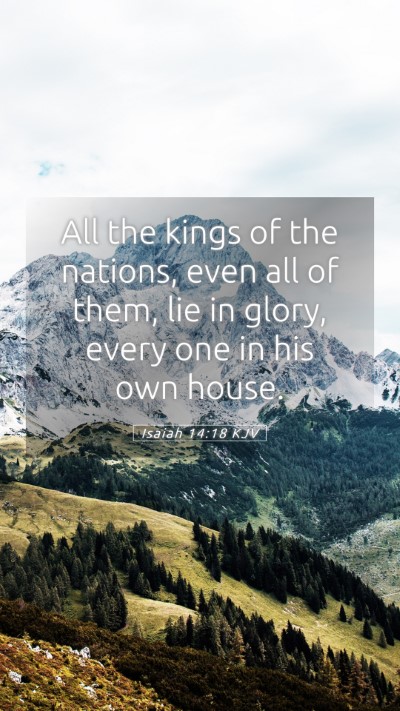Understanding Isaiah 14:18
Bible Verse: Isaiah 14:18 - "All the kings of the nations lie in glory, each in his own tomb." (ESV)
Summary and Exegesis
Isaiah 14:18 presents a profound commentary on the fate of earthly kings contrasted with the eternal glory of God. This verse forms part of a passage directed towards the king of Babylon, illustrating the transient nature of human power and glory.
Key Insights from Public Domain Commentaries
-
Matthew Henry:
Henry describes how this verse serves as an indication that all earthly kings, despite their power, ultimately return to the grave, lying in glory as noted in their sepulchers. This lays bare the vanity of earthly ambition and power.
-
Albert Barnes:
Barnes emphasizes that the verse signifies the ultimate fate of the proud and mighty. The glory and power achieved in life do not accompany one beyond death, underscoring the equalizing aspect of death for all leaders.
-
Adam Clarke:
Clarke interprets the phrase 'each in his own tomb' as a reflection on the personal legacy left behind. He notes that while earthly kingdoms may rise and fall, every individual has an appointed end, regardless of status.
Biblical Context
In the broader context of Isaiah 14, this verse fits within a narrative that prophesies judgment against Babylon and, more generally, against arrogant nations. It serves as a reminder that earthly powers are not everlasting.
Significance of the Verse
The significance of Isaiah 14:18 extends beyond its historical context, speaking to modern readers about the fleeting nature of worldly achievements. It invites contemplation on the eternal versus the temporal, urging believers to prioritize their spiritual lives over earthly pursuits.
Application to Daily Life
Understanding this verse can encourage individuals to reflect on their priorities, seeking eternal significance in their actions rather than merely temporal achievements. It serves as a reminder that true glory comes from living a life aligned with God’s purpose rather than the pursuit of earthly recognition.
Related Bible Cross References
- Psalm 146:3-4 - "Put not your trust in princes, in a son of man, in whom there is no salvation."
- Ecclesiastes 3:20 - "All go to one place. All are from the dust, and to dust all return."
- 1 Peter 1:24 - "For all flesh is like grass and its glory like the flower of grass. The grass withers, and the flower falls."
Conclusion
Isaiah 14:18 serves as a powerful reminder of the limitations of earthly dominion while affirming the ultimate authority of God. As we study this verse, we receive insights into the nature of human glory and the call to pursue a richer, more meaningful life grounded in faith.
Further Study and Reflection
For those engaged in Bible study groups, this verse can fuel discussions around the meaning of earthly glory versus heavenly reward. Utilize various Bible study tools and resources to deepen your understanding of this passage and its implications for Christian living.


